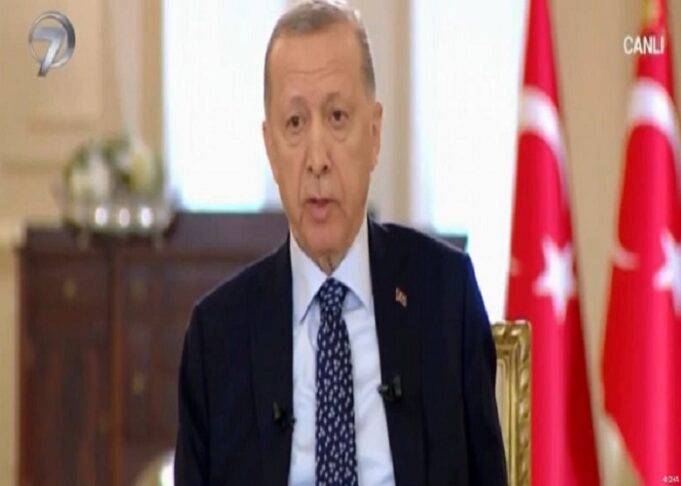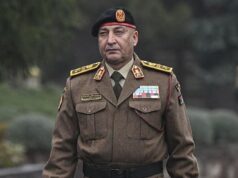Recep Tayyip Erdogan has won Turkey’s run-off presidential election to seal another five-year term, according to official preliminary results that marked an end to a determined opposition effort to unseat the longtime leader.
Erdogan received 53.41 per cent of the votes, electoral chief, Ahmet Yener, said on Sunday evening, after 99.43 per cent of the ballots had been counted.
His rival Kemal Kilicdaroglu received 46.59 per cent according to the preliminary figures, Yener said.
Erdogan – who claimed victory hours before the official announcement – can now remain in his seat for another five years and for a third time.
The 69-year-old became prime minister in 2003. The parliament voted him as president in 2014.
“You gave us this mission. We will continue to build a Turkish century all together. All of Turkey has won. Democracy has won,” he told a massive crowd from the balcony of the presidential palace in Ankara.
The crowd cheered and taunted his rival, chanting: “Bye bye, Kemal.”
During the evening, Erdogan supporters lined the streets of cities in Turkey and beyond, waving flags and celebrating.
Since the introduction of a presidential system in 2018, he has more power than ever before, prompting fears his rule could become even more authoritarian.
READ ALSO: Erdogan leads in Turkey’s presidential election results
Kilicdaroglu, who stood against him at the head of a broad coalition of opposition parties, thanked his supporters before the results were announced, but did not formally concede.
“I am sad much bigger problems await our country,” he said.
He decried the problems in an election campaign that was criticised by observers as being unfair, given the government’s dominance of the media landscape.
Erdogan controls almost the entire conventional media in Turkey. State broadcaster TRT did not broadcast a single interview with any opposition leader, for example.
Erdogan refused to appear in any televised debate with Kilicdaroglu.
Sunday’s voting was marred by reports of attacks on election observers in Istanbul and the south-east of the country.
Istanbul lawmaker, Ali Seker, from the main opposition Republican People’s Party (CHP), said he and two others were attacked by a large group of locals after they complained about irregularities.
Earlier, CHP parliamentary group leader, Ozgur Ozel, tweeted that election observers were beaten and their phones were broken.
Ozel complained that there were not enough security forces present at the time.
There were several incidents in Istanbul, according to media reports. It was reported that opposition election workers were attacked in the Gaziosmanpasa and Umraniye districts.
Not all incidents could be independently verified.
Even before the preliminary results were announced, congratulations flowed in from abroad.
The leaders of Russia, France, Pakistan, Libya, and Afghanistan all sent messages of support to Erdogan.
Ukrainian president Volodymyr Zelensky shared his congratulations to the Turkish president in both Ukrainian and Turkish on Twitter.
“I congratulate the President of Turkey Erdogan on the occasion of the victory in the presidential elections,” Zelensky said in a tweet.
NATO Secretary General, Jens Stoltenberg, also offered congratulations to Erdogan.
In a tweet, Stoltenberg wrote: “Congratulations President Erdogan on your re-election. I look forward to continuing our work together & preparing for the NATOSummit in July.”
U.S. President Joe Biden offered congratulations and said: “I look forward to continuing to work together as NATO Allies on bilateral issues and shared global challenges.”
Many in Turkey had hoped for change, but were in the end outnumbered, with Erdogan particularly popular among rural and more religious voters.
The run-off, the first in modern Turkish history, was a test of strength for Erdogan after he failed to get the absolute majority needed in the first round of the vote two weeks ago.
During the campaign, Erdogan had promised to increase religious conservative policies such as restricting LGBT rights.
He said he would quickly reconstruct the quake-hit provinces while boosting investments in defence and infrastructure.
He repeated some of these promises on Sunday, saying that he would bring inflation down to 10 per cent in a new “economic leap forward.”
The vote came amid Turkey’s worst economic crisis in two decades and after February’s devastating earthquakes in the country’s east.
- 2027: Tinubu inaugurates c’tee on conflict resolution, mobilisation for APC - December 24, 2025
- 2 Kano lawmakers die in one day - December 24, 2025
- Christmas: Tinubu urges Nigerians to embrace peace, unity, religious tolerance - December 24, 2025









